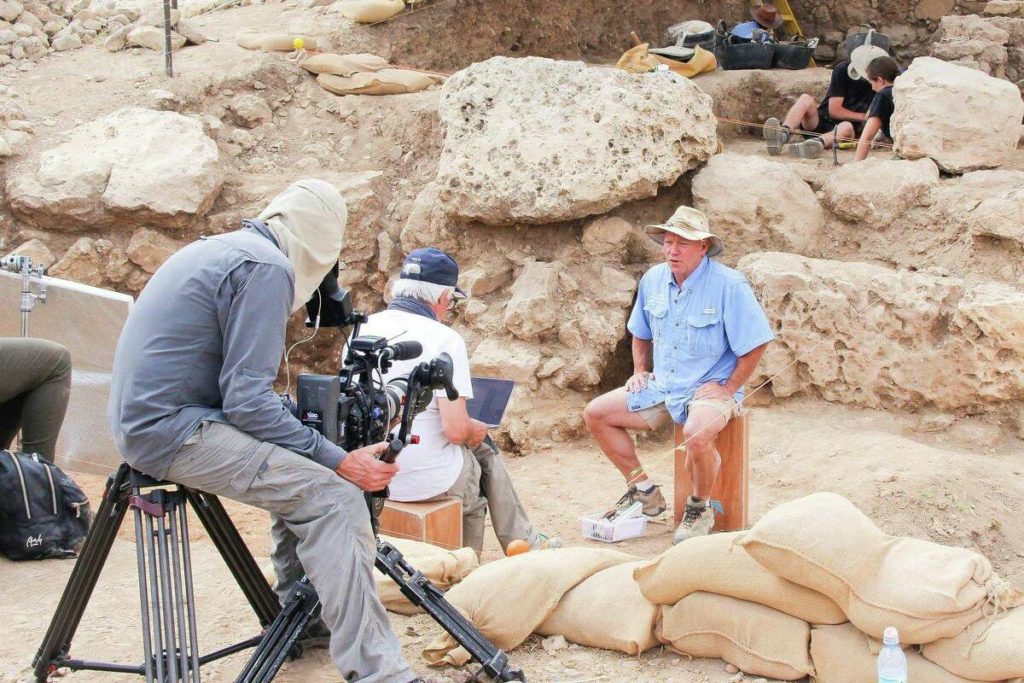Israeli archaeologists have found a 3,000-year-old lead plate that reproduces a fragment of Deuteronomy 27: 15-26 and Joshua 8:30, threatening disobedient with curses from God, Christianheadlines reports.
The new discovery by Israeli archaeologists may be one of the most significant archaeological finds in modern history, as it not only reproduces the biblical text, but also confirms the traditional, conservative understanding of the Old Testament timeline. The sensational discovery was announced on March 24 by Scott Stripling from the Institute for Archaeological Research at the Bible Theological School in Katie, Texas, USA.

The sensational discovery is a folded lead plate two centimeters long and a centimeter wide with a 40-letter Hebrew inscription mentioning the events on Mount Ebel from Deuteronomy 27: 15-26 and Joshua 8:30, when the Israelites were told they would be cursed if they disobey God. At the place where Mount Ebel was located in ancient times, a plaque was found in which the name of God is mentioned twice. More importantly, the text is “centuries older than any known Hebrew inscription from ancient Israel,” according to a statement from the Institute for Archaeological Research. A laboratory in Prague scanned the plaque. The transcribed text reads: “Cursed, cursed, cursed – cursed by the God Yahweh. You will die cursed. Cursed you will surely die. Cursed by Yahweh – cursed, cursed, cursed.”
“If you measure the importance of an archeological find on a scale of one to 10, then this is definitely a finding that stands at point ten,” Stripling said at a press conference. Its significance cannot be overestimated … It is impossible to find more specific evidence to support a [biblical] text, it is simply impossible to imagine anything greater than this. I can’t even believe that we found such an artifact. “According to preliminary laboratory data, says Stripling, the plate dates from the Late Bronze Age, ie 3300-1200 BC, which means that its age is around 3-5 thousand years.

Secular critics of the traditional dating of the Old Testament often date the Exodus from Egypt and the conquest of Canaan to a much later time – and thus question the veracity of Scripture. These critics claim that the Pentateuch could not have been written by Moses, as the Bible claims, because the Hebrew alphabet did not exist during his earthly life. However, the text of the tablet seems to confirm the authorship of Moses. Thus, according to Stripling, the new discovery confirms the biblical text.
“No one can unwaveringly claim that the biblical text” could never have been written during the Persian period (559-331 BC) or the Hellenistic period (323-30 BC), “such as “So far, respected critics have claimed it,” the scientist triumphed. – Now we have every reason to date the period of the biblical text much earlier. This changes the balance of scientific debate in favor of an earlier date and refutes the arguments of those who believe the Bible is a later compilation. “
A detailed scientific study with a complete analysis of the findings and a transcript of the text will be published in the coming months, Stripling said.
Archaeologist Gershon Galil from the University of Haifa also believes that the significance of the discovery can hardly be overestimated. “Such a text can be found, perhaps, not more than once in a millennium,” Galil said in an interview with The Times of Israel. – There is nothing unusual in the fact that this discovery will be recognized as one of the greatest archeological discoveries in recent history. This is the first scientifically confirmed mention of God’s name in the land of Israel, and it moves the period of proven literacy of the Israelites back several centuries and proves that the Israelites were literate already in that ancient period when they first arrived in the Holy Land. Accordingly, they could write the Bible, especially since the text of the tablet almost literally reproduces a fragment of the biblical text that has come down to our time.

